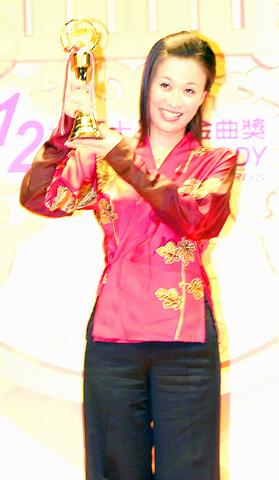In a competition in which mainstream artists with strong sales dominated, Adia (
The best album went to newcomer Jay Chou (

Na Ying (

PHOTO: TAIPEI TIMES
In the eyes of the music industry, where money is the bottom line, the male nominees are small potatoes compared to the women. "Females have much higher recognition," said Perry Ko (
Taiwan's top seller at Tower Records in 2000 was Faye Wong (

PHOTO: TAIPEI TIMES
"The market for female singers is much, much bigger than the market for the guys," said Ko. "There's kind of a weird split. Female pop singers get both guys and girls buying their albums, but male pop singers only get women buying the records."

PHOTO: TAIPEI TIMES
In a predictable award ceremony, in many categories, winners seemed to be selected on their record sales, with mainstream artists pushing out less famous names. A massive crowd attended the gathering, held for the first time in the event's 12-year history in Kaohsiung. The broadcasting rights for the event, which for the last three years have been held by TVBS, were taken for the first time by ETTV.
In an early surprise, Sun Yan-zi (

PHOTO: TAIPEI TIMES
Occasionally lapsing into English, the Singapore native said she was "surprised," "very happy," and that she appreciated the support and friendship of the other nominees.
Sun's fame has grown rapidly over the last two years, and a career comprised of only two CDs and a string of TV commercials has been sufficient to make her a star.
The conservatism of this year's Golden Melody Awards was further revealed by Chiang Hui's (
According to Ma Nien-hsien (
Sticky Rice was praised at the beginning of the award ceremony by Kaohsiung mayor Frank Hsieh (謝長廷) as "representing a new element in Taiwan." Despite this, the trend toward picking big names was working against the group. Last year, there had been criticism that many of the winners were relatively unknown in the mainstream, and this year judges seem to have gone out of their way to pick only those groups that have been moving CDs in the stores.
Speaking after receiving their award, Ah Hsin (
While there were good crowds attending the event, some members of the public did give voice to the idea that such mainstream festivals did not altogether reflect their musical interests. "I like Jay Chou (
Liu Chia-chang (劉家昌), one of Taiwan's most prolific writer of golden oldies, received a lifetime achievement award. As the writer of the hit In Praise of the Republic of China (中華民國頌) and other patriotic songs, he spoke about how, under the DPP government, people now tiptoe around the name "Republic of China." This caused some embarrassment for the presenter of the award, the deputy director general of the Government Information Office.
Another usually minor category was for Best Classical Music, in which category the soundtrack for Crouching Tiger, Hidden Dragon was knocked out of the competition because it was not pure classical music, according to the judges. Officials said that a new movie soundtrack category may be incorporated in next year's event.

This is the year that the demographic crisis will begin to impact people’s lives. This will create pressures on treatment and hiring of foreigners. Regardless of whatever technological breakthroughs happen, the real value will come from digesting and productively applying existing technologies in new and creative ways. INTRODUCING BASIC SERVICES BREAKDOWNS At some point soon, we will begin to witness a breakdown in basic services. Initially, it will be limited and sporadic, but the frequency and newsworthiness of the incidents will only continue to accelerate dramatically in the coming years. Here in central Taiwan, many basic services are severely understaffed, and

Jan. 5 to Jan. 11 Of the more than 3,000km of sugar railway that once criss-crossed central and southern Taiwan, just 16.1km remain in operation today. By the time Dafydd Fell began photographing the network in earnest in 1994, it was already well past its heyday. The system had been significantly cut back, leaving behind abandoned stations, rusting rolling stock and crumbling facilities. This reduction continued during the five years of his documentation, adding urgency to his task. As passenger services had already ceased by then, Fell had to wait for the sugarcane harvest season each year, which typically ran from

It is a soulful folk song, filled with feeling and history: A love-stricken young man tells God about his hopes and dreams of happiness. Generations of Uighurs, the Turkic ethnic minority in China’s Xinjiang region, have played it at parties and weddings. But today, if they download it, play it or share it online, they risk ending up in prison. Besh pede, a popular Uighur folk ballad, is among dozens of Uighur-language songs that have been deemed “problematic” by Xinjiang authorities, according to a recording of a meeting held by police and other local officials in the historic city of Kashgar in

The People’s Republic of China (PRC) was out in force in the Taiwan Strait this week, threatening Taiwan with live-fire exercises, aircraft incursions and tedious claims to ownership. The reaction to the PRC’s blockade and decapitation strike exercises offer numerous lessons, if only we are willing to be taught. Reading the commentary on PRC behavior is like reading Bible interpretation across a range of Christian denominations: the text is recast to mean what the interpreter wants it to mean. Many PRC believers contended that the drills, obviously scheduled in advance, were aimed at the recent arms offer to Taiwan by the